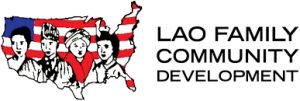
Lao Family Case Study
Organization: Lao Family Community Development is dedicated to helping immigrant, refugee, and U.S.-born low-income families achieve long-term social and economic self-sufficiency.
What problem is being solved? Staff at Lao Family, from front line staff to administrators, work with many clients in crisis or experiencing unemployment and housing challenges. As a result, the staff may experience secondary trauma from their work. The administration of Lao Family Community Development wanted to give their team tools to cope with the stress of their jobs.
Curricula Used: Mind Matters: Overcoming Adversity and Building Resilience was used for staff professional development. In addition to the staff using Mind Matters themselves, the staff are encouraged to use what they have learned from Mind Matters in interactions with clients.
Program Setting: Professional development day held in the community room at the Lao Family Community Development facility.
Location of Instruction: Sacramento and Oakland, California.
Length of Instruction: Three 6-hour training days.
Class Size: 30-35 staff members attended the training. (50% of the Lao staff)
Target Audience: Lao Family front line staff and administrators
Audience Demographics:
- Majority of staff are in their late twenties.
- Many staff members are immigrants and English is a second language.
- Diverse ethnic backgrounds.
Funding: CalWORKS Homeless Assistance | Office of Emergency Services (Cal OES).
Curricula Benefits:
- Provide staff with easy to use self-soothing and emotional regulation skills.
- Improve staff interactions.
- Informally teach Mind Matters content to clients.
Instructors: The Mind Matters author and a Dibble Training Specialist
Participant Journals:
- Each staff member received a copy of the Mind Matters journal which includes skills practices and opportunities for reflection and goal setting.
- Instructor manuals were provided for the staff.
Incentives: Good food and snacks were provided, contributing to a sense of being valued and appreciated.
Observable Outcomes:
- Staff who attended the training manage their emotions better than those who did not attend.
- Staff who attended were better able to self-sooth.
- The training director was able to tell who had and had not attended based on the new skills they were using.
- The training provided a common language and framework for discussing emotional and mental health issues.
Challenges:
- Difficulty coordinating time off for staff to attend the training.
- Training was adjusted to emphasize staff professional development instead of teaching participants how to teach the material to clients.
- Will need periodic refreshers due to staff turnover and new hires.
Tips for Others:
- Consider incorporating small segments of the training into regular staff meetings for ongoing reinforcement and train staff who were not able to attend training.
- Utilize short, related videos as reminders of training content such as Mind Matters Minutes and Me and My Emotions.
- Explore opportunities for booster sessions or follow-up trainings to ensure ongoing application of skills learned.

